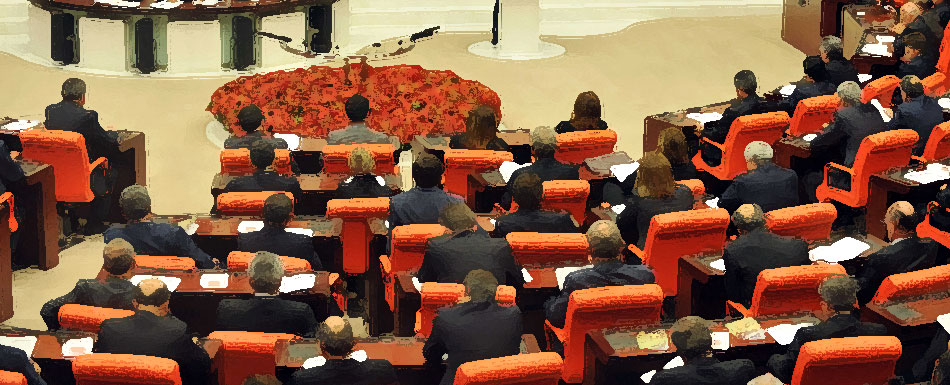What is Fethullah Gülen’s stance on political issues?

Fethullah Gülen, as a Turkish intellectual and scholar, is well respected and admired by vast majority of Turkish population from almost all political backgrounds. Only a small percent of secular elites and some marginal Muslim groups are critical of Fethullah Gülen and the Gülen Movement.
Gülen has repeatedly stated that to ideologize Islam and its use as an instrument in politics harm Islam first; several time, he condemns the politicization of religion. As Hakan Yavuz pointed out at an interview with Religioscope in 2004, Gülen always wanted religion to remain above politics, because he is concerned that politics would corrupt religion. In his analysis of the Gülen Movement, Dr. Rainer Hermann also states that the Gülen Movement is a social and apolitical movement.
Gülen publicly stated that "We are in equal proximity to all parties. I am not saying equal distance, we are in equal proximity. Because all the followers and sympathizers of every party are our people. People's parties and people's political ideas are not barriers to our being friends with them."
Gülen met with many political party leaders from different ideological backgrounds. The late Turgut Özal (center right), Alparslan Türkeş (nationalist), Bülent Ecevit (left wing), Süleyman Demirel (center right), Tansu Çiller (center right) and Mesut Yılmaz were among them. He didn't speak about daily politics with any of them. He accepted the meetings as opportunities to talk about the country's issues. It is true that Gülen respected Özal and Ecevit greatly. However, he never became their political supporter. Furthermore Özal and Ecevit appreciated his services and respected him. However neither sought electoral support or political support from Gülen.
Gülen has been praised by many scholars for his contribution to democracy and modernity in Turkey.
While this is Gülen’s stance with regards to politics, it would be a mistake to assume that people in the Gülen Movement do not participate in elections. Of course, similar to any other citizens of the country, people who are inspired by the teachings of Fethullah Gülen also participate and vote in the democratic elections in Turkey. However, it would be also a mistake to assume that these people vote for a specific political party as a bulk. Gülen Movement includes people from different political affiliations and backgrounds. Therefore, it would be appropriate to assume that these people vote accordingly.
Similar to general population in Turkey, people in the Gülen Movement vote for different parties at different elections. For instance, it is stated that the Movement voted for right-wing democratic party of Turgut Ozal during his government, it is also stated that the Movement voted for the left-wing democratic party of Bulent Ecevit during another election. For now, it is suggested that the Gülen Movement voted for the current government of Justice and Development Party.
Even though, these statements may make sense for those who know Turkish politics, it is also necessary to know that these are -at best- educated guests. There has not been any study done in Turkey that can provide data to support these statements.
If these statements are accurate, then, people in the Gülen Movement are not only for different parties at different times, but they are voting for parties from different ideological stance (e.g. Ozal’s center right party, Ecevit’s left-wing party, and Erdogan’s conservative democratic party). Yavuz states that people in the Gülen Movement do not necessarily vote for Muslim parties. They actually try to stay away from any party that describes itself as "Islamic" or "Muslim".[1]
Recently, several blog articles published in some websites accusing Fethullah Gülen being the political power behind Turkey’s ruling party, AKP (Justice and Development Party), and Gülen leads Turkey towards an Islamic State.
Even though, most of these articles posted/published in radical places and not worthy to pay attention, it is necessary to clarify Gülen’s relation to politics and power.
In these articles, Gülen is accused for being behind the AKP and taking Turkey towards an Islamic state. The accusers of these claims know perfectly that Gülen is against even an idea of Islamic state.
With regards to Islamic state, Hakan Yavuz points out:
“According to Gülen,…it is anti-Islamic to talk about an Islamic state. But you can create a conscious Muslim. You can create Muslim networks. You can create Muslim ethics and good models of coexistence by utilizing Islam. But when Islam becomes a model for the state, Gülen believes it is not Islam anymore.
His goal is to raise Muslim consciousness and to get involved in modernity, democracy and a free-market economy, so as to get Muslims to enter into those global processes.”[2]
[1] Yavuz, Hakan. 2004. The Gülen Movement: a modern expression of Turkish Islam - Interview with Hakan Yavuz. Religioscope: http://religion.info/english/interviews/article_74.shtml
[2] Ibid.
- Created on .
